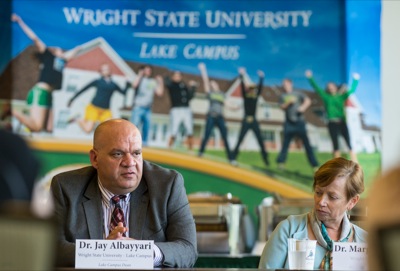Tuesday, June 23rd, 2015
Wright State-Lake program to focus on rural practices
By Jared Mauch

Photo by Mark Pummell/The Daily Standard
Dr. Jay Albayyari, dean of Wright State University-Lake Campus, and Dr. Margaret Dunn, dean of Boonshoft School of Medicine at WSU in Dayton, speak Monday about a new medical school program at the Lake Campus, Celina.
CELINA - Wright State University-Lake Campus is adding a medical program that focuses on rural practices.
Dr. Margaret Dunn, dean of the Boonshoft School of Medicine in Dayton, spoke to about 20 lake campus faculty, staff and local hospital representatives about building a clerkship program (similar to an internship) at the campus for medical students and eventually implementing a full, four-year medical program at the campus.
"I feel strongly that if you educate a physician to be capable to be practicing in a rural environment, in a resource-constrained environment, you're preparing someone who can do a fabulous job of taking care of people anywhere," Dunn said.
A physician trained for a rural setting can be more educated about practices with limited resources, she said.
Dunn said time in a clerkship is very important to students because it is an opportunity to see firsthand what it is like in the medical field on a daily basis. It can either reaffirm their career choice or change their mind completely, she said.
The clerkship opportunity will be open to all third-year students in the program. A key to setting up the program is ensuring physicians are available for students' clerkship.
"What we were exploring was could we pull together physicians willing to work with our students so that we offer those very important experiences to medical students in this area with Grand Lake (Health) System and Mercer (Health) System, physicians in this area," Dunn said.
An experimental clerkship program was held in 2014 at the lake campus. Six students worked with local physicians for the year.
Representatives from local hospital boards and WSU faculty members worked together to start the clerkship program at the Celina campus.
"We're hoping that the group will continue to work together and deepen this relationship," Dunn said.
The schedule for fall classes is still being completed and the total number of prospective students in the program has not been finalized.
"I believe the demands of this area and having the support of the local health cares and the community itself, it is possible to continue to look at the offering of the med school program here," Lake Campus Dean Jay Albayyari said.
He said a timetable has not been set to implement the entire program; it may take a few years, he added.
The average medical student at WSU incurs about $179,000 in educational debt when he or she graduates, Dunn said. She would like to create scholarships to help with the finances, she said.
"My primary fundraising initiative is with scholarships so I can avoid this debt for my students," she said.
If students can graduate with less debt, they may be more willing to consider going to medical school, she said.
"We applaud the efforts of Wright State to bring a program locally to recruit to our community," Lisa Klenke, CEO of Mercer Health said.
She is looking forward to the opportunity to replenish current physicians as they retire in the coming years, she said.
Dunn said there may soon be a shortage of physicians as a large population of baby boomers grows older throughout the country.
Kevin Harlan, CEO of Grand Lake Health Systems, stressed the importance of primary health care.
"Our greatest need is primary care. Without primary care we can't call the specialists in. What makes our health systems work is primary care in the communities we serve," he said.
Lake Campus' planned adoption of a medical degree program comes as part of a proposed expansion of facilities and other programs to be funded through its "Rise. Shine. Campaign," which began in October with a combined goal of $150 million for capital improvements at the Dayton and Celina campuses. The deadline is the university's 50th anniversary celebration in 2017.
So far, the campaign has garnered $113 million, Albayyari said at a recent Celina Rotary Club meeting.


